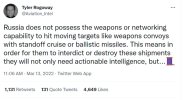Republican US Senator Lindsay Graham, who has called for the detention and assassination of Russian President Vladimir Putin, chastised US President Joe Biden for refusing to allow Soviet-made fighter jets in Poland to be sent to Ukraine, as the US president feared it would escalate the Ukrainian military crisis into a global nuclear war.
Sen. Lindsey Graham (R-SC) stated on Sunday that if chemical weapons are used by the Kremlin in Ukraine, he would support creating a no-fly zone over the country.
In an
interview with Fox News' Maria Bartiromo, the ranking Republican lawmaker said that the canceled transfer of Polish-owned Soviet-built jet fighters to Ukraine was an example of the Biden administration folding up "like a cheap suit."
"The Biden administration
stopped that transfer. One minute they’re saying, ‘well they’re not using the planes we have but if we give them more it would be WWIII’," Graham said. "What happened is Putin threatened Biden, and he folded like a cheap suit. Give them the planes."
Additionally, Graham said US Vice President Kamala Harris' speech in Poland this week regarding Washington's diplomatic stance with the NATO's eastern partners was "not an adequate substitute of MiGs going into the Ukraine to help the Ukrainians defend themselves."
"I’m all in. I don’t want no boots on the ground, no-fly zone yet," he stressed, before adding, however, that "if there are chemical weapons used by Putin, that’s a war crime, and then I support a no-fly zone."
Graham rejected fears of
a third world war if the US sent fighter jets to Ukraine, although the Kremlin has explicitly stated that it would consider a transfer of fighters in the conflict to be a red line, while also accusing the Biden administration of dragging its heels.
The conservative GOP senator additionally suggested that fears of a possible nuclear war by the Kremlin were a "bluff", adding that the Russian president must be ousted from power by any means necessary, including assassination.
"It’s not going to be WWIII. This is all a bluff. Putin knows that no one wins a nuclear exchange," he said. "If he ordered a preemptive strike on the United States, some general would shoot him in the head."
Last week, Russian President Vladimir Putin warned that any planes or other military assets attempting to enforce a no-fly zone would be treated as a military target.
Graham's suggestive commentary comes after the US Department of Defense stated on Sunday that it saw no indicators of an impending chemical or biological strike in Ukraine by Moscow, although NATO Secretary General Jens Stoltenberg earlier claimed that Russia may be contemplating a chemical attack.
“Well, I want to be careful. We don't get into intelligence assessments here. We continue to watch this very, very closely. It is of the Russian playbook … they accuse you of [what] they're planning to do now. Again, we haven't seen anything to indicate some sort of imminent chemical, chemical biological attack right now, but we're watching this very, very closely,” US Defense Department spokesperson John Kirby told the ABC broadcaster.
Those accusations were rejected by the Kremlin as unfounded. Also this week, Moscow
released data exposing what it claimed was a secret US-linked biological facility in Ukraine.
The Russian military asserted that the Pentagon's Defense Threat Reduction Agency has been involved in the operation of over 30 biological laboratories across Ukraine, and that the labs are involved in the storage and research of a number of deadly agents.
According to the Russian Defense Ministry, evidence
has been discovered that suggests Kiev is developing biological weapons to target ethnic groups. The Russian Defense Ministry additionally asserted that, based on samples obtained during the Kremlin's ongoing special military operation in Ukraine, Kiev scientists had investigated bird migration between Russia and Ukraine as a prospective vector for a biological weapon.
On Tuesday, Under Secretary of State for Political Affairs Victoria Nuland acknowledged that Ukraine has "biological research facilities," adding that the US is concerned that they could fall under Russian control, raising concerns by some that projects under development in these laboratories could see pathogens placed under combat conditions.
After the breakaway Donbass republics requested assistance in defending themselves against attacks by the Ukrainian military, the Kremlin on 24 February declared a special military operation in Ukraine. As a result, Western nations and other countries around the world launched a broad range of crippling anti-Moscow sanctions while sending high-tech weapons and other logistical resources into Ukraine as foreign mercenaries enter the country en masse.




















